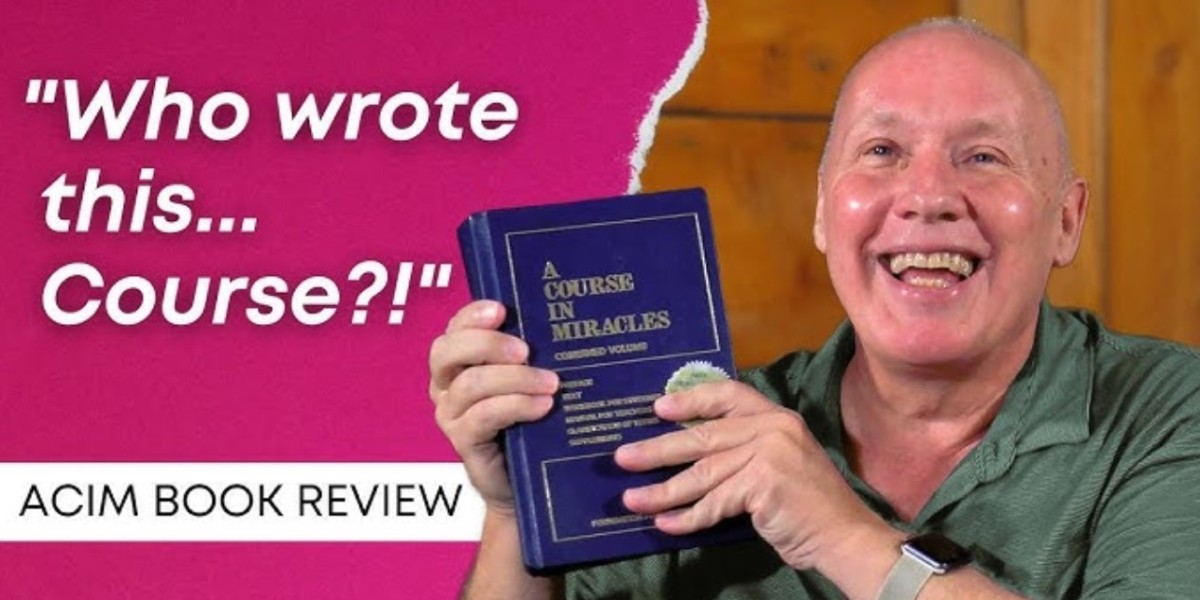In a world full of distractions, stress, and emotional challenges, finding a path to inner peace and healing can be overwhelming. Many people are turning to spirituality and self-help resources to navigate their personal struggles. One resource that stands out among the rest is A Course in Miracles (ACIM). It’s a transformative program that guides individuals toward self-healing, inner peace, and a profound understanding of life. But why is A Course in Miracles often considered the ultimate tool for self-healing? Let's explore.
1. Introduction to A Course in Miracles
A Course in Miracles (ACIM) is a spiritual guidebook designed to help individuals heal from emotional and psychological wounds through forgiveness and love. Unlike many self-help programs, ACIM focuses on changing your mindset, teaching you how to shift from fear-based thinking to love-based thinking. But it’s not just about healing on the surface; it’s about deep transformation, leading to lasting peace.
So, why does ACIM stand out as the ultimate tool for self-healing? The secret lies in its core teachings, which address the root of our pain—our thoughts. It gently dismantles the negative perceptions we hold about ourselves and the world, allowing true healing to take place.
2. What is Self-Healing?
Before diving into how ACIM works, let's understand what self-healing really is. Self-healing is the process of using one’s inner resources to overcome emotional, mental, and sometimes even physical challenges. It’s not just about “getting better”; it’s about developing the tools to cope with stress, trauma, and emotional turmoil in a way that leads to personal growth.
Healing from within means recognizing that the power to feel better lies within your own thoughts, emotions, and reactions. And this is where ACIM plays a crucial role.
3. The Core Teachings of A Course in Miracles
At the heart of A Course in Miracles are three core ideas:
- Forgiveness: Not just forgiveness of others, but of yourself.
- The Illusion of Fear: Fear is a product of your mind and not real.
- Love as the Ultimate Truth: Love is the only real thing; everything else is an illusion.
These teachings aren’t just abstract spiritual concepts. They are practical lessons designed to change how you think and, consequently, how you feel. The belief is that healing comes when you shift your perception of the world from one of fear and separation to one of love and unity.
4. How ACIM Supports Mental and Emotional Healing
We all carry emotional baggage—old wounds, unresolved conflicts, and deeply rooted fears. These weigh us down and affect our mental health. ACIM offers a unique approach to addressing these challenges by encouraging individuals to change their thoughts about themselves and the world.
Through daily lessons and meditative exercises, ACIM teaches you how to let go of judgment, release fear, and embrace a new way of thinking. This shift in perception allows for emotional healing, as the thoughts that once caused pain lose their power over you.
5. Releasing Fear Through ACIM
One of the key elements of self-healing in ACIM is the release of fear. Fear, according to ACIM, is a false belief—an illusion created by our mind. The course teaches that all emotional pain stems from fear and that by letting go of this fear, we can experience peace.
Example: Imagine fear as a shadow. When you shine the light of love on it, the shadow disappears. Similarly, ACIM shows you how to shine the light of love on your fears, causing them to dissipate and no longer control your emotions.
6. The Role of Forgiveness in Healing
Forgiveness is a cornerstone of ACIM, and it plays a vital role in self-healing. Often, the anger, resentment, and guilt we hold onto prevent us from healing emotionally. ACIM teaches that by forgiving others and ourselves, we release the mental blocks that keep us in a cycle of suffering.
Forgiveness in ACIM is not about condoning harmful actions, but about freeing yourself from the emotional prison of holding onto past hurts. When you forgive, you heal.
7. ACIM as a Spiritual Path to Self-Healing
For many, self-healing is not just about mental or emotional recovery—it’s a spiritual journey. ACIM provides a framework that blends spiritual principles with practical healing strategies. It teaches that the self is not just the body and the mind, but the spirit. Healing occurs when we connect with our true spiritual nature, which is rooted in love.
As you study ACIM, you begin to see yourself and others as spiritual beings. This shift in perspective can lead to profound healing on all levels—mental, emotional, and spiritual.
8. Healing Relationships with ACIM
One of the most common sources of emotional pain is relationships. Whether it’s a difficult family dynamic, a toxic friendship, or a painful breakup, our relationships often cause us to suffer. ACIM offers valuable insights into healing relationships by encouraging forgiveness, compassion, and love.
By applying ACIM’s teachings, you learn to stop projecting your fears and insecurities onto others, leading to healthier, more loving relationships. The course helps you understand that every relationship is an opportunity for healing and growth.
9. How ACIM Encourages Mindfulness
Mindfulness is about being present in the moment, without judgment. ACIM promotes mindfulness by teaching you to observe your thoughts without getting caught up in them. Instead of reacting to every negative thought or emotion, you learn to pause, reflect, and choose a different response based on love, not fear.
This mindful approach to life can dramatically reduce stress and anxiety, making room for healing to occur naturally.
10. Practical Steps to Implement ACIM in Daily Life
While ACIM’s concepts may seem abstract, they are meant to be lived in everyday life. Here are a few practical steps to start your journey:
- Daily Lessons: ACIM provides daily lessons that guide you through the process of changing your thoughts.
- Meditation: Spend time each day in quiet reflection, focusing on love and forgiveness.
- Journaling: Write about your experiences with ACIM, noting any shifts in perception.
- Practice Forgiveness: Actively practice forgiving yourself and others, even in small ways.
By incorporating these practices, you will begin to see real changes in your emotional and mental well-being.
11. Real-Life Success Stories from ACIM Practitioners
Many people have experienced life-changing results from practicing ACIM. From healing long-standing emotional wounds to finding peace amidst personal chaos, the stories of ACIM practitioners are both inspiring and encouraging.
For instance, one practitioner shared how ACIM helped them overcome anxiety and depression by teaching them how to forgive themselves for past mistakes. Another person used ACIM to heal their relationship with a family member they had been estranged from for years.
12. The Science Behind ACIM and Healing
While ACIM is rooted in spiritual teachings, there’s a growing body of research that supports the idea that changing your thoughts can lead to healing. Studies in psychology and neuroscience show that our thoughts directly impact our emotions and physical health.
By reducing stress and promoting positive thinking, ACIM can trigger the body’s natural healing processes. The course’s emphasis on forgiveness and letting go of negative emotions is aligned with psychological principles that suggest emotional release is key to well-being.
13. Challenges in Practicing A Course in Miracles
While ACIM offers immense benefits, it’s not without challenges. One of the biggest obstacles is the idea of forgiveness, especially in situations where someone has been deeply hurt. Many people find it difficult to let go of resentment or to believe that their thoughts can truly heal their pain.
Another challenge is the discipline required to follow the course consistently. The daily lessons and practices take time and effort, and it can be easy to fall back into old habits of negative thinking.
14. Is ACIM Right for Everyone?
While A Course in Miracles has helped countless people, it may not be for everyone. The spiritual nature of the teachings can be difficult to grasp for those who are skeptical or not interested in spiritual concepts. Additionally, some may find the language of ACIM challenging, as it uses terms like "miracles" and "God" that may not resonate with everyone.
However, for those open to exploring a spiritual path to self-healing, ACIM offers a powerful framework for personal transformation.
15. Conclusion: The Power of Self-Healing with ACIM
In conclusion, A Course in Miracles is much more than a self-help program—it’s a spiritual journey that leads to deep and lasting healing. By teaching you how to shift your perception from fear to love, ACIM provides the tools you need to heal emotionally, mentally, and spiritually. It encourages forgiveness, promotes mindfulness, and offers a path to inner peace that is both profound and practical.
FAQs
- What is A Course in Miracles?
A Course in Miracles is a spiritual self-study program that teaches principles of love, forgiveness, and mental transformation to promote healing. - How does ACIM help with self-healing?
ACIM helps individuals shift from fear-based thinking to love-based thinking, promoting forgiveness, mindfulness, and emotional healing. - Is ACIM a religious text?
While ACIM uses spiritual language, it is not tied to any particular religion. It is a spiritual guide focused on inner transformation and healing. - Can ACIM help with anxiety and depression?
Yes, many practitioners have found that ACIM’s teachings on forgiveness and changing negative thought patterns can significantly reduce anxiety and depression. - Is ACIM difficult to practice?
ACIM can be challenging at first, particularly the concept of forgiveness. However, with dedication and practice, it becomes easier and more rewarding over time.








